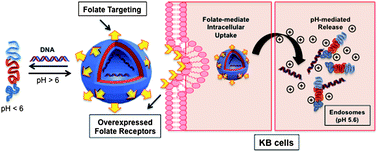In this article, Vicent, Salmaso, Alexander and co-workers prepared a modular and effective controlled release system, based on polymers designed to respond to the pH-changes that occur in tissues affected by peculiar disease. The individual blocks were composed of (a) permanently hydrophilic chains with neutral functionality and (b) acrylate polymers with weakly basic side-chains. Variation in co-monomer content, molar mass and block ratios/compositions led to a range of pH-responses, manifested through reversible self-assembly into micelles and/or polymersomes. These transitions were tuned to achieve environmental responses in a pH range from 5–7. The ability of the systems assembled with these polymers to act as pH-responsive containers was shown by DNA encapsulation and release studies, and their potential for application as vehicle for drug delivery was proved by cell metabolic activity and cell uptake measurements.
Synthesis and characterization of variable conformation pH responsive block co-polymers for nucleic acid delivery and targeted cell entry by Teresa Matini, Nora Francini, Anna Battocchio, Sebastian G. Spain, Giuseppe Mantovani, Maria J. Vicent, Joaquin Sanchis, Elena Gallon, Francesca Mastrotto, Stefano Salmaso, Paolo Caliceti and Cameron Alexander Polym. Chem. 2014, 5, 1626-1636.
Julien Nicolas is a web-writer and advisory board member for Polymer Chemistry. He currently works at Univ. Paris-Sud (FR) as a CNRS researcher.











